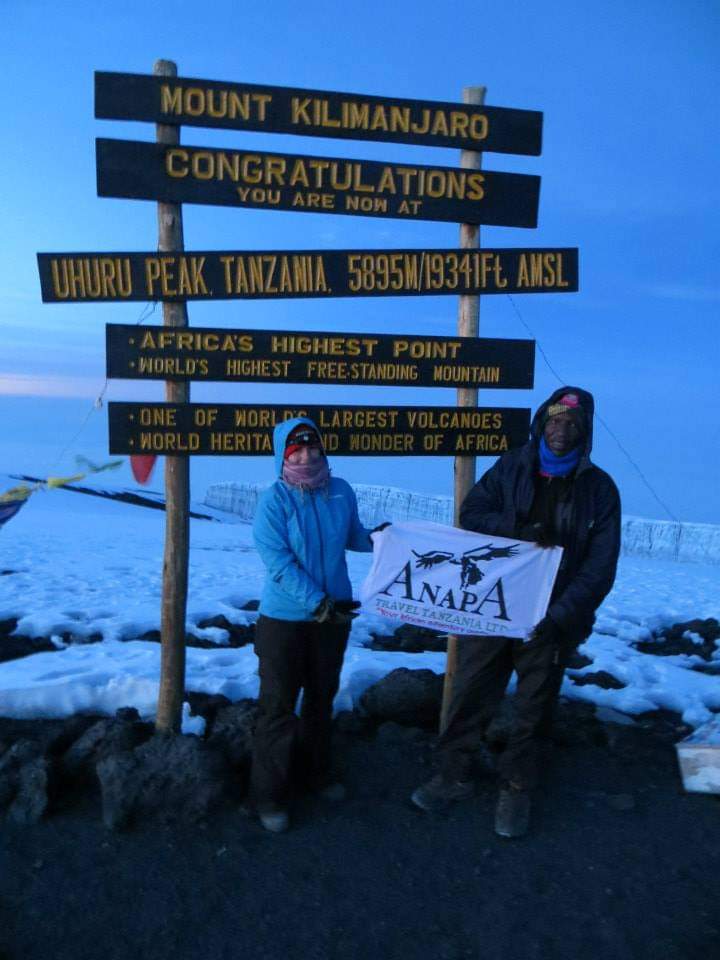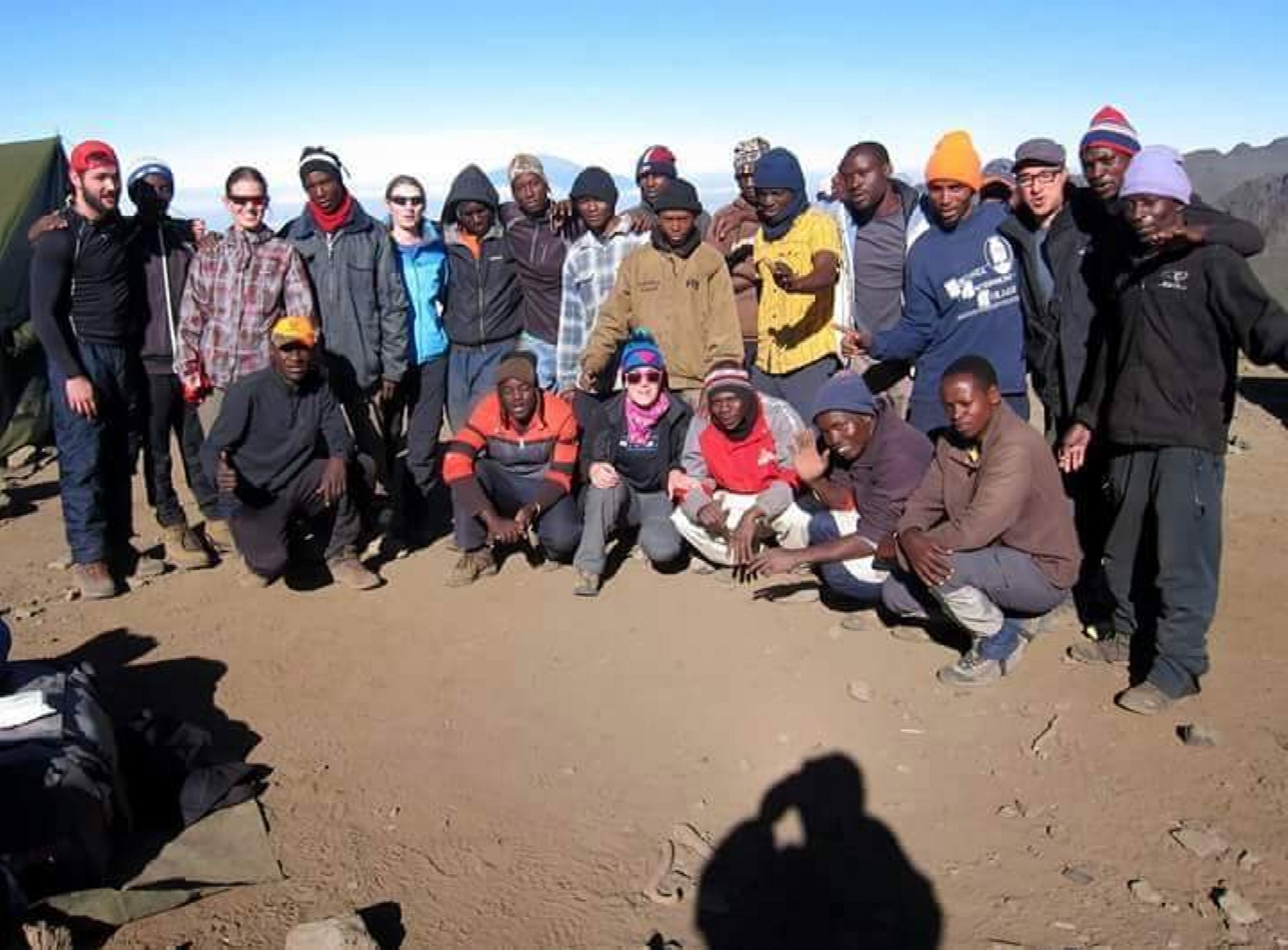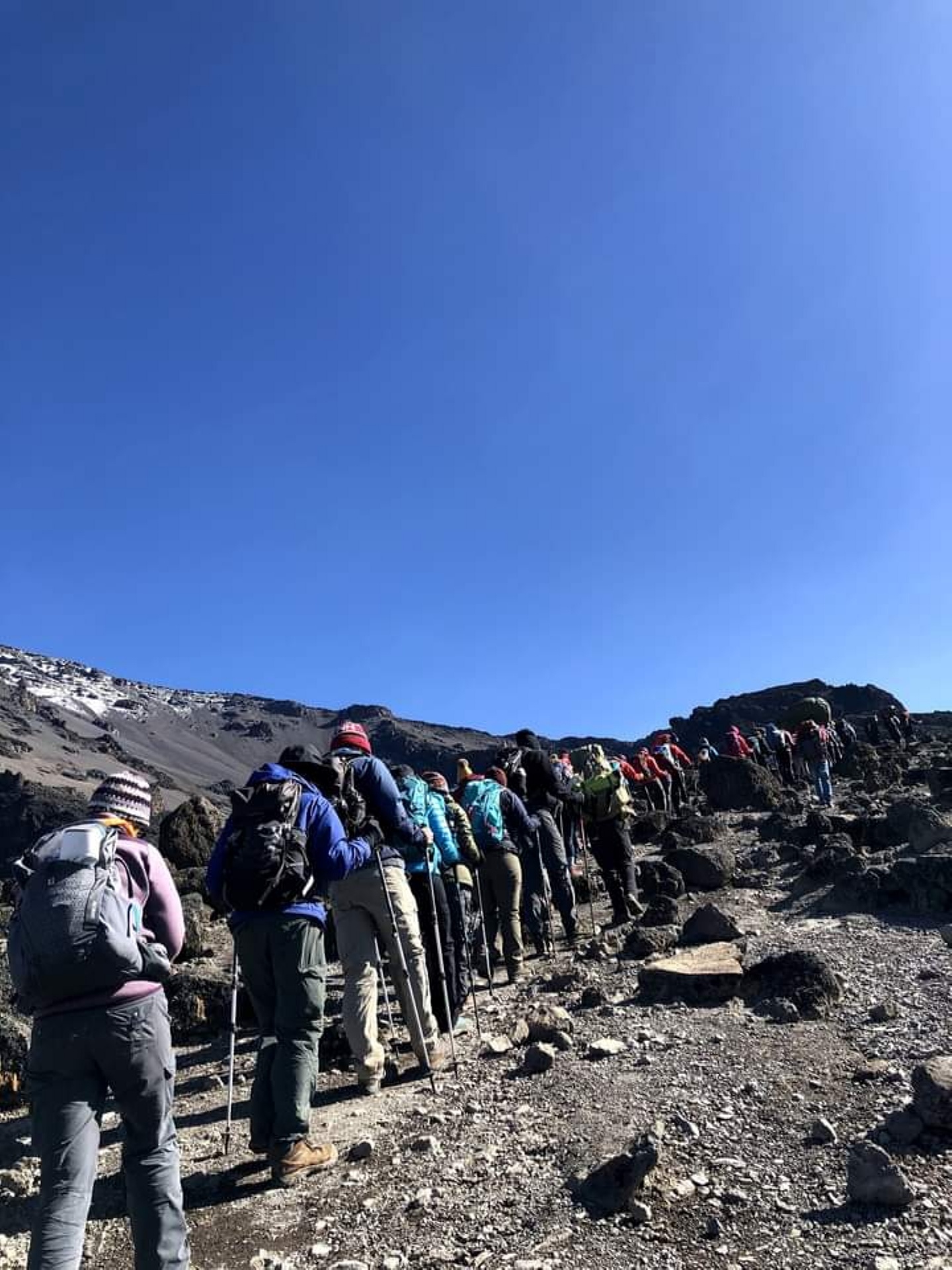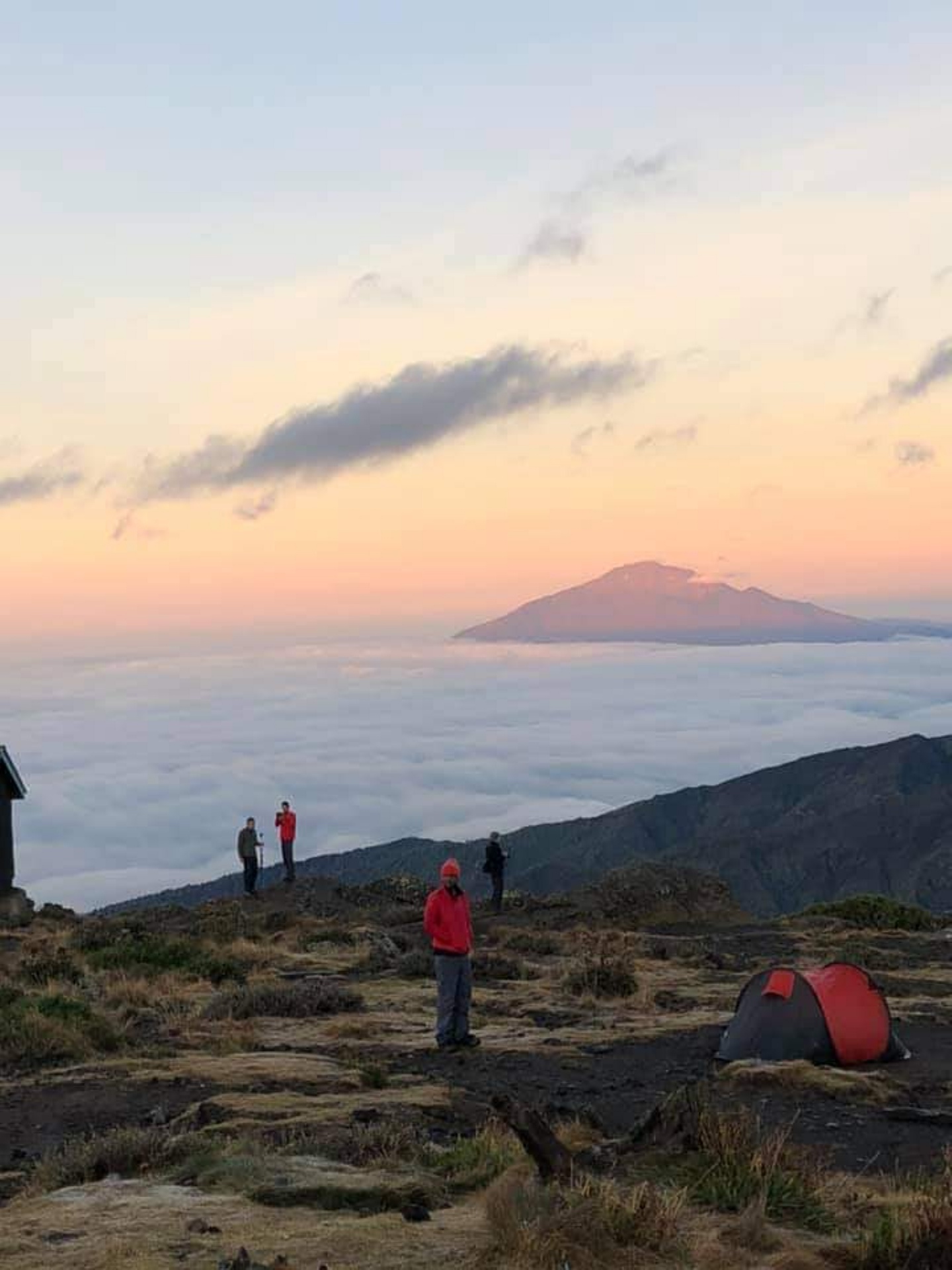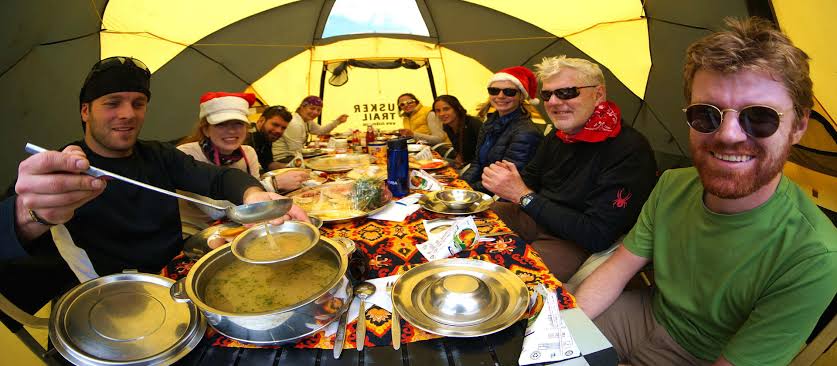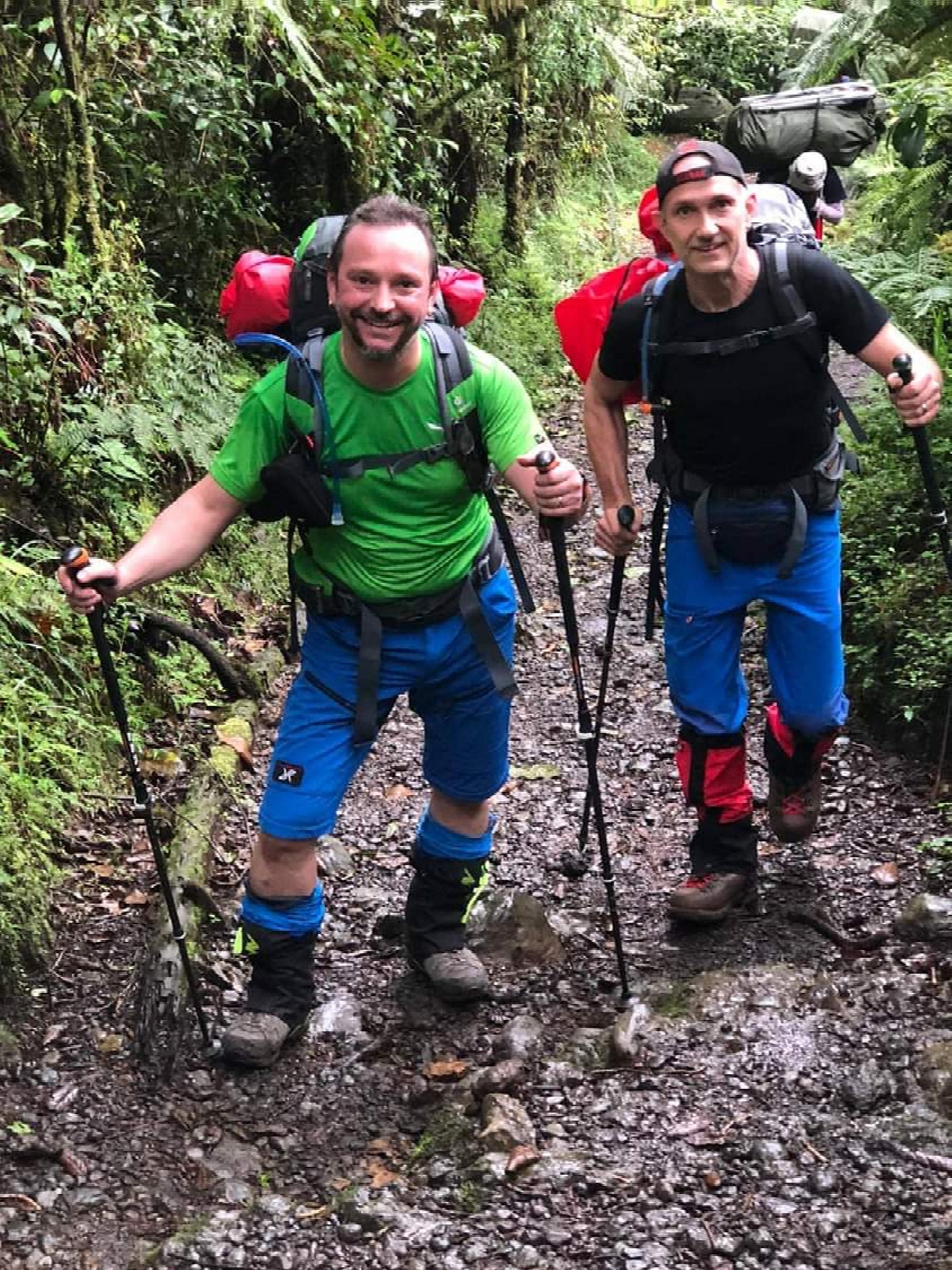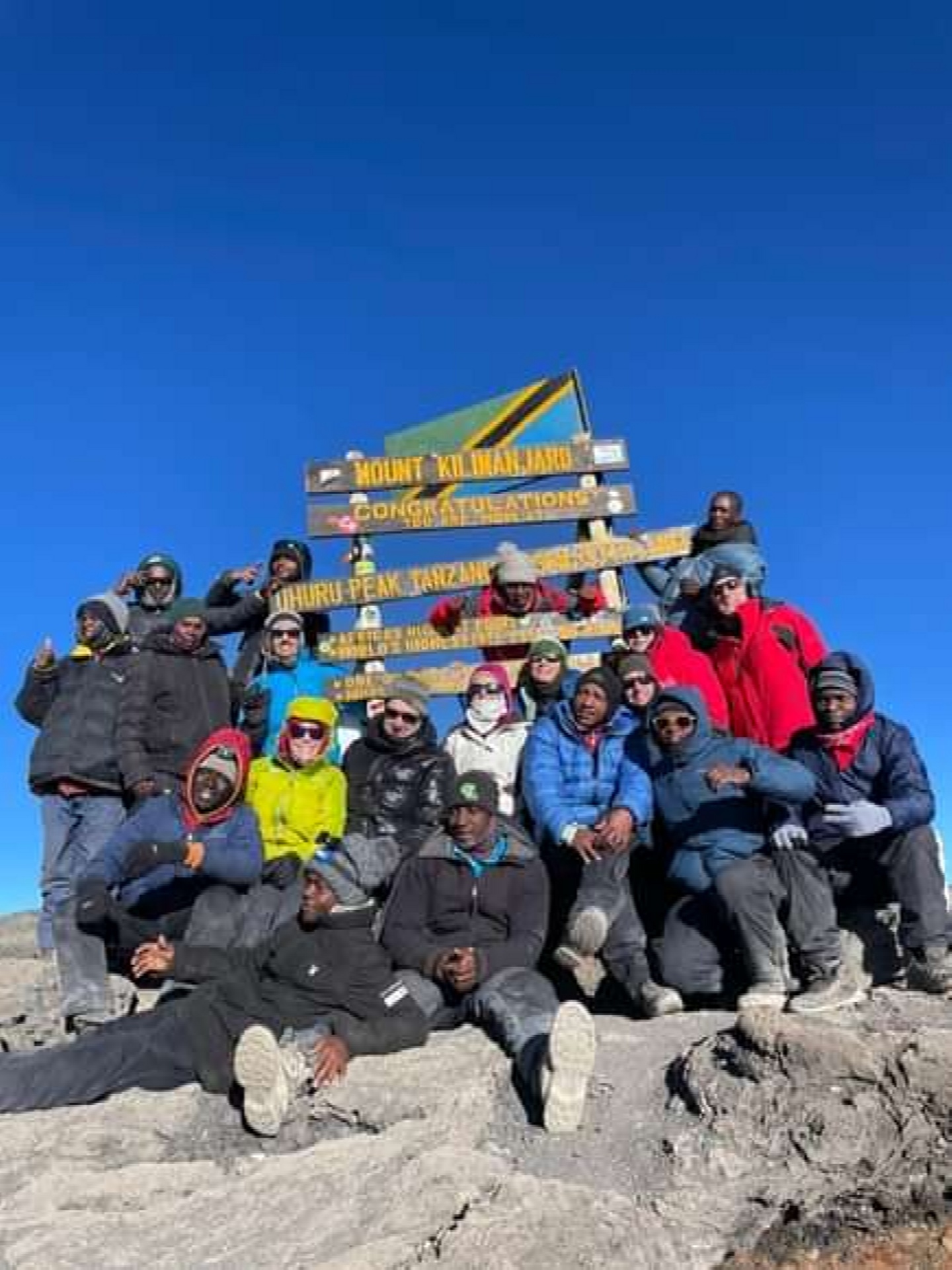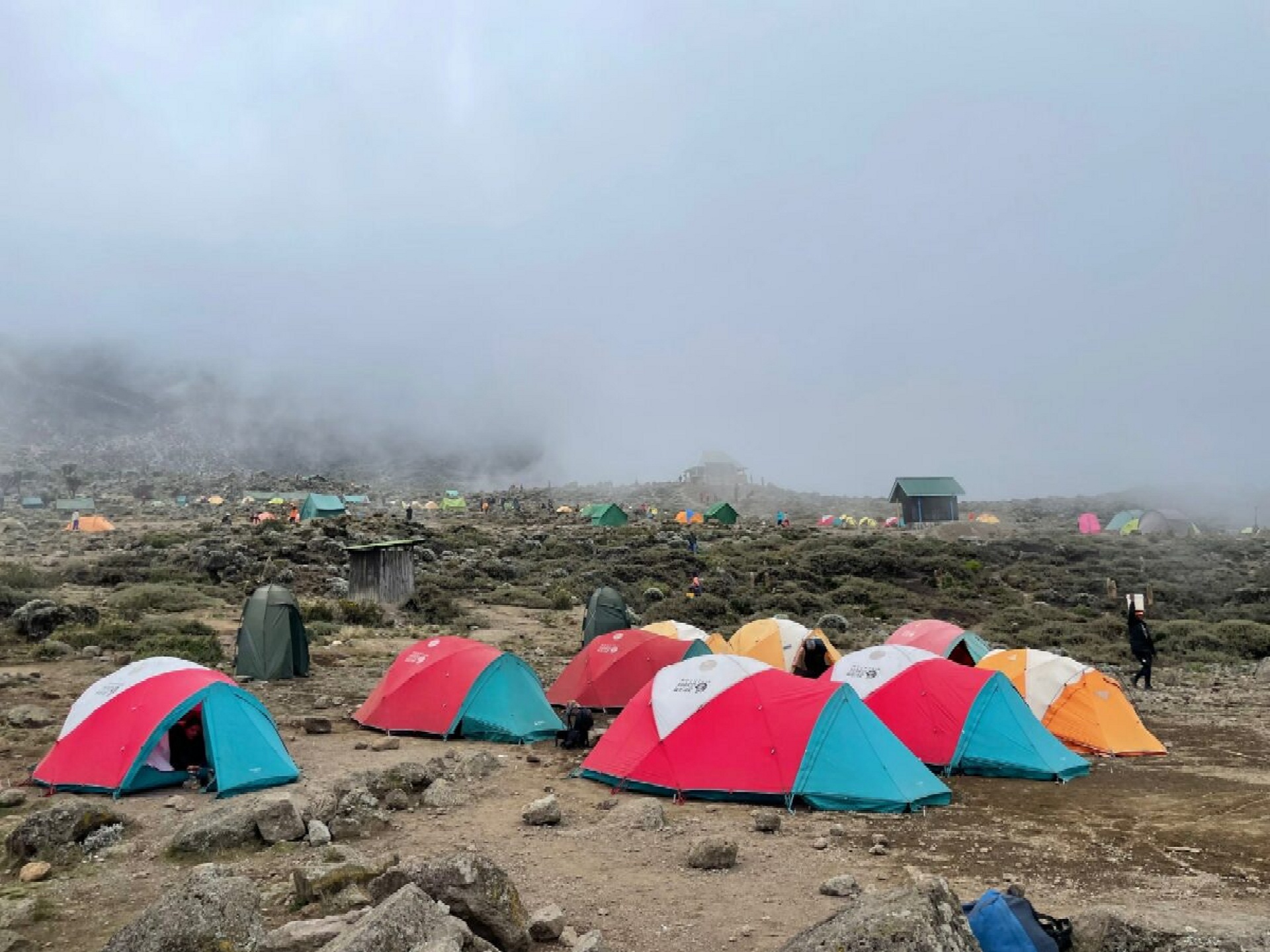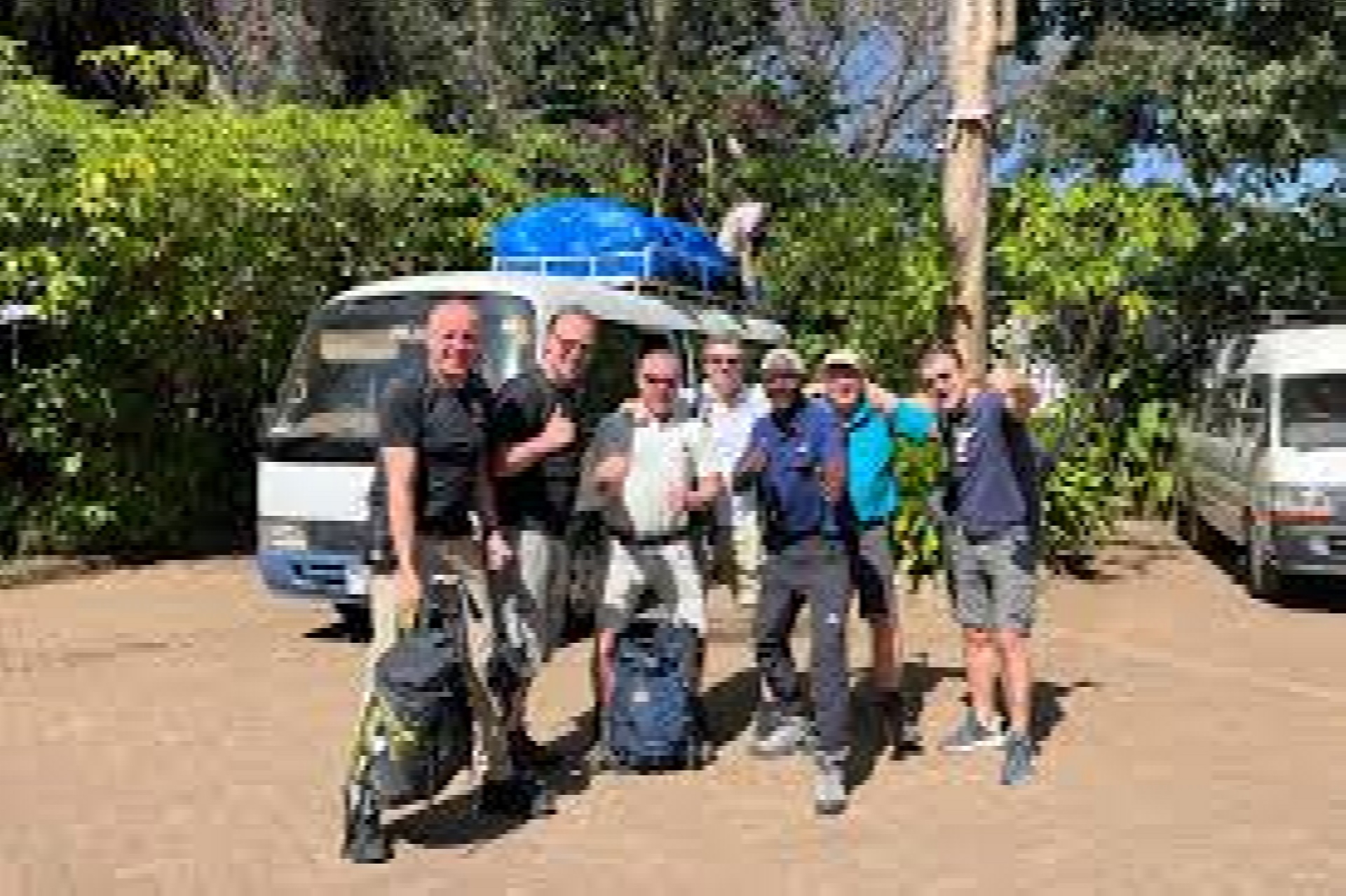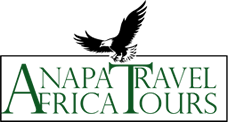6-Day Tanzania Holiday Kilimanjaro Climbing Rongai Route
- Days 06 Private Tour Available
- From ₹ 165,807.00
- Free Cancellation
- Best Price Gurantee
About this activity
- Instant Booking
- Free Cancellation Free cancellation up to 30 day(s) prior departure, after which the tour cancellation policy applies Learn More.
- Duration:6 Day(s)
- Activities
- Park
- Mountain
- Sightseeing
- Adventure
- Nature
- Hiking & Trekking
- Travel StyleBudget
- Guiding Type: Live Guide/Instructor
- Guide Language
- English
- Tour Vibe Active
- Recommended For
- Couple
- Senior
- Solo
- Women
- Youth
- Destination
Country:
Africa,
Tanzania,
- Mount Kilimanjaro
- Pickup
Moshi town Hotel.
From: To:
8:30 AM 9:00 AM - Drop-off
Moshi town Hotel.
From: To:
3:00 PM 5:30 PM - Age Range 10 - 99 (Years Old)
- Experience the thrill of reaching the summit of Mount Kilimanjaro
- Enjoy the stunning views of the surrounding area from the summit
- Stay in budget mountain huts and campsites on the Rongai Route
- Trek through the montane forest, moorlands, and alpine desert
- Celebrate your success with a warm meal and a relaxing shower
Embark on a 6-day trek to the summit of Mount Kilimanjaro via the Rongai Route. Stay in budget mountain huts and campsites and enjoy the stunning views of the surrounding area from the summit.
ITINERARY
After breakfast,, we drive to the Kilimanjaro National Park Gate Rongai route. Your trek can begin. Hike through a pine forest and climb gently through a forest. The trail is not steep, but is rather a gentle hike through beautiful country. The first night's camp is at 1st First Cave Simba camp, at about 2,600 meters above sea level.
Continue up towards Kibo, passing Second Cave (3,450m) en-route, and reaching Kikelewa Cave at about 3600 meters. The views start to open up and you begin to feel you are on a really big mountain. Water is in the obvious stream below the cave, although you might have to wander downhill a way to find some. Overnight at 3rd Cave camp (Kikelewa Caves) with all meals included.
A short but steep climb up grassy slopes offers superb views of this wilderness area. The vegetation zone ends shortly before you reach your next camp at Mawenzi Tarn, spectacularly situated beneath the towering spires of Mawenzi. Spend the afternoon acclimatizing and exploring the area. All meals are served at camp.
Continue ascending on the east side of Kibo crossing the saddle between Mawenzi and Kibo taking 4 to 5 hours to reach Kibo Hut. The remainder of the day is spent resting in preparation for the final ascent, which begins around midnight. Overnight at Kibo Camp with all meals served.
Today is “The Big Day” – the summit stage. The mountain guide will wake you up at 23:00 hrs and you will begin the long and strenuous trek to the summit. Passing the Hans Meyer Cave at 5,220 m, the climb slowly but surely goes upwards. At sunrise, you will reach Gillman’s Point (5,681 m) – the crater rim of Kilimanjaro – where the sun will slowly start to warm up the land. You will have soon forgotten the cold of the night and after a further hike of 1 – 2 hours, you will reach Uhuru Peak at 5,895 m. At peak, you can celebrate your accomplishment of reaching the “Roof of Africa”. The route back down follows the same path; the lava ash will now have thawed and allows for a fast descent. On your return to Kibo Hut, a warm meal awaits you and you can regain your strength. Following a 1 – 2 hour break, you will once again be on your way hiking to the Horombo Hut (3,700 m) for your stay.
The last stage passes through the heath and moor zone to the Mandara Hut (2,700 m) where a warm lunch is waiting for you. Soon, you will once again pass the tropical rainforest and after a total time of 6 hours trekking, you will be back at the Kilimanjaro National Park Gate (1,860 m). After saying goodbye to your mountain guides and porters, a transfer follows to take you back town.
WHAT’S INCLUDED
| Location | Nights | Type | Property Name | Rating | Occupancy |
|---|---|---|---|---|---|
| Mount Kilimanjaro | 5 | Camping | Select One | Shared |
- Hotel
- Halal
- Jain
- Kosher
- Meat
- Vegan
- Vegetarian
- Private Vehicle
WHAT’S EXCLUDED
- Flights
- Insurance
- Extra Services
Other Excluded:
Personal Full climb gears
Covid Safety
No Covid
Availability
- Aug2025
- Sep2025
- Oct2025
- Nov2025
- Dec2025
Tour Cancellation Policy
Free cancellation up to 30 day(s) prior departure, Or traveler will pay 50 % of the tour amount
*** Important Notices, Terms and Conditions *** – Reservation: A deposit of 30% of the tour cost is required on time of booking within 10 days, and the balance not later than 30 days before commencement of the safari tour. Payment in full is required where bookings are made less than 30 days before the tour begins. Notwithstanding any prior confirmation of arrangements, the right is reserved not to execute tours if payment has not been received in accordance with foregoing. 50% deposit is required 10 weeks before intended departure with the balance to be settled 30days prior to commencement of the tour. If a reservation is made within 30 days of departure, the entire amount must be made at the time of confirmation. – Confirmation: A booking is considered confirmed upon receiving a deposit of 30% of travel cost. Balance payments can be made on arrival for only camping safaris and mountain climbing. Of course you can also pay the entire amount at once to save time and banking costs – TRANSPORTATION: Well-maintained Vehicles, Land Cruisers, Land Rovers, Toyota Minibuses with pop up roof that are rebuilt for safari and excellent cars, Station wagons or Coaches for transfers will be provided according to the route and number of participants. The right is reserved to employ the services of sub-contractors. *Cancellation & No Shows and bank expenses:* – Land tour cost: For cancellation prior to 60 days before the departure date there will be a cancellation fee equal to the advance payment. In the event of cancellation, the deposit will be refunded less the cost of expenses incurred, that is administration fees, bank charges, and if the cancellation is received 15 and 60 days before the departure date there will be a cancellation fee equal to 50% of the total trip costs. Between 59 to 3 days, fee will be charged according to what other suppliers (lodges) state about terms. In case of cancellation within 48 in the case of a no-show 100% of the net value of the booking will be charged. There will be no refund if a member leaves a trip for any reason either voluntarily or involuntarily after the trip has begun, whether for personal reasons or as a result of the guide’s advice & decision. Trip cancellation insurance is strongly recommended. – For Climbers, No refund will be made for any services not utilized including -but not limited to- faster ascents/descents (skipping days) & non-use of the Crater camp when applicable. – Bank expenses: All bank (transfer) expenses will be paid by the client and all prices are quoted in US$ Dollars. We prefer payments by Wire Transfers through bank, which are subject to bank charges at the prevailing/current rate. Please make sure you arrange this with your local bank (mark transfers as ‘all costs for sender’). * Passport, Visa, Insurance. * – Passport and visa: All members must be in possession of a valid passport and the required visa. A company will advise and assist only, but it is client’s responsibility to provide the correct documents. If you hold Tanzania Resident permit you are needed to present by show (The passport copy) at each parks entrance gate. – Insurance: Though it is not required by the Tanzanian National Parks, it is advised that members are protected by insurance that covers cancellation, accident, health, emergency evacuation, mountaineering and loss of or damage to baggage and personal effects. * Tour alteration &Responsibility:* TOUR ALTERATION:The right is reserved to change any route or arrangements should conditions necessitate, to offer substitutes of equal value, or to accept the operation of any scheduled tour. The right is reserved to decline to accept or retain any person as member of any tour at any time, in which event an equitable amount will be refunded. Responsibility: A companya acts as an agent only for the passenger in all matters relatingto hotel accommodation and other contractors.A company shall not be held liable for any injury, damage, loss, delay and irregularity that may be occasioned for any reason, including, but not limited to, wild and domestic animals, altitude disease in any form, malaria and other diseases, the acts of God, detention, terrorism, war, strikes, thefts, pilferage, force-majeure, civil disturbances, government restrictions or regulations, accidents by air-craft, boat, bicycle, or any other (non) motor vehicle, or any hotel/ lodges, inn, restaurant or accommodation. When going on safari you understand and accept that you are entering wildlife reserves, with possibly dangerous animals, with no guarantee to actually see the ‘big five’ or other specific animals. Or when climbing Kilimanjaro, you understand and accept that reaching the summit can not be guaranteed and you may suffer from cold or altitude-related illness and you might have to abort the climb, your guide will decide the best actions that will benefit you and your health the best.
Tour Date Change Policy
Tour Date can be changed 30 day(s) prior departure
Good To Know
- Acclimatization days are recommended before the trek.
- Be prepared for varying weather conditions.
- Physical fitness is required.
- Altitude sickness medication may be necessary.
- Stay hydrated and follow your guide's instructions for a safe trek.
FAQs
Which is a best route to climb Kili?
The one question we are asked more often than any other is “which is the best route to climb Kilimanjaro”. And the answer depends on what you want. Here are our winners.
The top success rate and overall best route to climb Kilimanjaro
If you want the highest chance of summiting, the best route to climb Kilimanjaro is the (Machameroute over 7 days and the Lemosho route for 9 days) these are Most scenic route approaching from the West wins hands down for the best views with spectacular vistas in all directions. If keeping away from the crowds is your top priority the (Rongai route for 7days) also has to be your choice as the best route for your Kilimanjaro climb. Excellent acclimatization and an easier summit night make this the winner by a long way. And as reaching the top is the most important thing for most of our climbers we make this our overall winner as best route to climb Kilimanjaro.
When is a best time or month to climb Kili?
After which is the best route, the next question we are asked most often is “When is the best time or month of year to climb Kilimanjaro”.
As with the best routes, there is no absolute best time or month to climb Kilimanjaro and it comes down to personal choice. You can climb Kilimanjaro any month of the year. You should though consider three main factors in choosing what will be the best time of year for you to climb Kilimanjaro. These are
The weather& Climate The main weather concerns while Climbing Kilimanjaro relate to cold temperature and precipitation. The best times to Climb Kilimanjaro are during the warmer and drier months. January, February and September are great times to climb. June, July, August are also very good months, though the weather is a bit cooler.
The only times that should be avoided are during Tanzania’s two rainy seasons. The long rainy season is from the end of March to the beginning of June and the short rainy season is from November to the beginning of December. Note that, The mountain’s weather is unpredictable.
2nd How busy the mountain is Traffic on the mountain is highest in the drier months but is particularly high during the late European summer months.
3rd The cheapest flights to Kilimanjaro Flight costs are also generally at their highest during this period. Also remember 60% of climbers start at the weekend, so try to avoid that rush with a midweek start date. Some of the cheapest flights to Kilimanjaro International Airport (code: JRO) can be obtained from Vayama or Expedia. However, these companies require a clear week before the departure date to enable them to issue tickets, whether paper or e-tickets. If you haven’t been able to allow enough time to find low cost flights to Kilimanjaro you’ll need to buy directly from the airline.
How experienced are the guides on Kilimanjaro expeditions?
Our guides are all very experienced, most of them having climbed the mountain more than a hundred times. Many of them started out as a porter, cook or assistants guide many years ago and know all the trails and the nature. They are all Handed Kili guide Certificates, registered and have been trained for medical emergencies and trek crews on Kilimanjaro are first aid trained . Most are educated well, and all speak English varying from basic until very well.
Can I/We Climb Kilimanjaro without porters or guides?
Are there any other options or would this just be plain stupid? You are not allowed to climb without guides, as it is a protected National Park. You could try to convince the park headquarters in Marangu to go without porters, but you’d better think twice about this. Even the easy routes will become incredibly hard if you have to carry 35+ kilos on your back (80+pounds).
You will need to carry that as a minimum to cover your food, gear etc. Also it means you will have to put up your own tent, get up early to get water and boil it etc. You have to be a very fit an experienced mountaineer to do this and do this good enough to have some energy left to do the actual climb…. The park fees alone are $700-900+ so you will not even save much on it…
Note that even if you prefer this, we will still arrange porters to assist the guide, as we won’t force them to go without porters. We will also not give any discount if you choose to carry and cook everything yourself.
Are young children allowed to climb Kilimanjaro?
The age limit as put into place by the Kilimanjaro park authorities is 10 years. There are several things to consider when taking children:
– The main Kilimanjaro routes are easy enough to be climbed by most fit children of 10 years+
– Children sometimes have trouble recognizing pain and as altitude disease will be a new experience, they might not be able to adequately tell you their condition.
– Children normally have much more energy, while on Kilimanjaro it is very important to ascend very slowly, even if the hike is non-technical and gradual on most routes.
Therefore children will be more likely to get sick at altitude. It is recommended only to take children if the expedition is longer than average, so preferably 8 days or more (which is better for everybody by the way). As all our trips are custom-made (no fixed group dates), we require that a parent, older sibling or good friend accompanies the child. It must be someone the child trusts enough to admit feeling sick etc. If you take your time, this will be the best cultural and self-confidence boosting experience you can give your child!
I am travelling by myself, can I join an existing group?
All our trips are private, which means that we cannot add you to an existing group, as those groups expect to be travelling with just their own team and friends. Sometimes groups are interested in having others with them, but we cannot promise this beforehand.
You can post a message on the tripadvisor.com or lonelyplanet.com on the forum (or on one of the other climbing and hiking websites). That way you might be able to find someone who might be able to go with you. Some of our groups have met this way and had a great trip together, even getting a group discount instead of paying extra for travelling solo. We can set up a private (solo) Kilimanjaro trip for an extra $250 single supplement if you are coming alone. If you can find some friends that want to join your trip after all, then we will refund the single supplement.
Even (personal) when climbing alone, you are very likely to meet the same climbers on the way and in the camps for many days. So in effect you will be climbing together, though everybody will keep their own pace. You will always have a guide, cook and porters with you, so even ‘alone’ is not really alone at all.
How do I book and pay ANAPA Travel Tanzania Kilimanjaro, safari or Zanzibar trip?
ANAPA Travel Tanzania offers only fully tailored trips, so you will never be entered in a strange group unless you would like that (it can be cheaper to share a car on safari for instance). This also means that we do not have fully fixed itineraries for your trip, but we enjoy thinking together with you about the best way to enjoy Tanzania within the limits of your available time and budget.
Please follow these steps; it is useful to start the booking process a few months in advance, especially when you want to go in high season (March/ July/ August/September), else there might be limited space left.
The booking process:
* You decide if you want to climb Kilimanjaro, go on safari, Zanzibar or a combination package.
* You decide the route on Kilimanjaro and the # of days or the Safari tour packages if its (Luxury safari/ Comfort safari/ Budget safari). If you have no idea or would like advice, just ask us, we will be happy to share our knowledge and experience with you. Together we will create the best trip possible, tailored to your preferences, needs, cash and timeframe.
* After we agree on the best trip for you we will make an online invoice, itinerary form with all the detailed prices and daily details.
* Then you should confirm your flight if you have not done so already and pay an deposit payment to secure your reservation on the trips. This is normally about 30% of the total trip costs, unless the trip starts within 30 days, then the full payment is needed (unless agreed otherwise, please ask if needed).
* if anything has to be changed, for example your flights do not match the schedule, or your friends decide to come after all, then we will adjust it! If the price per person decreases because the group is larger, then everybody will pay the lower costs. If the costs of our trips go up between agreeing on your trip and the trip itself, then your costs will never rise.
* The latest 30 days before the beginning of the trip you should pay the remainder of the sum.
We normally accept bank transfers only, either in USD or EUR. Paypal (from account or Credit Card) is possible, but it will increase the costs by 6-10% as this is what they charge us in total. We think that a Kilimanjaro trip is more than just a hard mountain hike, it’s a personal experience, that’s why we take our time and create the best possible itineraries together with our clients.
We also think it is a shame not to go on a safari or Zanzibar when you are in Africa; it’s really something you should have done in your life. Together with you we will create a trip of a lifetime!
What is included in the trip costs when I book with ANAPA Travel Tanzania Kilimanjaro trip?
– What is included in the trip costs when I book a Kilimanjaro or safari trip with ANAPA Travel CO?
– What are the additional costs?
Our Kilimanjaro and Meru prices include:
* All transport during trips, private vehicles used throughout.
* All park fees/permits, our own selected National Park approved guides & porters.
* Three-man mountain tents used for two people only. Stools, a mess tent and hot water for washing are provided on the mountain. We supply basic foam mattresses, for extra comfort/warmth you can bring inflatable (Therm-a-rest etc) or foam mattresses yourself, we will carry them.
* Food on the mountain is plentiful and prepared fresh by skilled cooks. Typical menus include: Breakfast – fruit, fruit juice, hot chocolate, coffee, tea, oats or muesli, egg, sausage, toast, margarine, honey and jam. Lunch – soup, chips, sandwiches, hot tea, coffee and chocolate, biscuits, pancakes with honey or jam, fruit. Supper – soup, cooked meat or vegetarian meal, fruit, variety of hot drinks.
* B&B in Hotel at Arusha before and after the climbs.
* New: we include one dinner before and one after the climb as well including a celebratory beer (or soda) after the climb!
Our safari’s include:
* a private car with op-up roof. Normally these are Land cruisers, Land rover or similar 4×4 vehicles, we have smaller and larger ones.
* All fuel for the cars
* A very knowledgeable driver/guide
* All nights in a lodge/hotel or tented camp, depending on the itinerary. On the camping safaris you will stay in smaller tents on special campsites
* Buffet dinner and breakfast
* Airport/hotel transfers from/to Kilimanjaro/JRO airport only.
Not included:
* Flights to Tanzania
* Tips to safari guide driver& Cook (for those wish to choose camping safari).
* Hotel meals/snacks other than dinner & breakfast at Arusha Hotels (2 nights included only).
* Personal expenses like drinks and souvenirs
* Visa (when you fly into Nairobi you need 2 visa, one for Kenya and one for Tanzania).
* Sleeping bags, clothing, poles and other personal gear.
Are the credit card, cash or travellers cheques accept at Arusha?
Don’t count on acceptance of credit cards… as you will prepay all hotels and tours, the only thing you need is some cash for drinks, tips, gifts etc.
Please bring as much US dollars in small denominations (useful for tipping) as you think you need. There might be some spots where they accept CC, but it can change any day, so do not depend on it.
It also might be costly to pay with CC and the risk for abuse is much greater over there.
Travellers cheques can be changed at most banks, but they do cost a lot I think.
Tanzanian Shillings cannot be exported, so you will have to get them in the country. Dollars can be exchanged in Arusha or Moshi, the exchange office is open every day until 13.00
What if a member in a group want to turn back?
Climbing Mount Kilimanjaro is not the easiest of treks, many that attempt the trek do not make it to the top mainly due to the very high altitude. The experience in itself is spectacular and rewarding whether you reach the top or not. If you feel that you are unable to carry on or if the guide feels it’s unsafe, you will be assisted down with the guide to the nearest campsite or hut.
What kind of food is served for the climb?
On the first day of the climb you will be provided with a packed lunch box, made by the chefs in Naaz Hotel. The ingredients for the rest of your meals will be carried up by the porters and the food will be made by a cook. A combination of packed and hot meals will be prepared. The menu is set to ensure that your food intake is sufficient for the level of exertion you will experience during the climb. This will include a balance of carbohydrates, protein and vegetables and fruit. You may wish to bring additional snacks for your climb such as chocolates, nuts, candy/sweets, biscuits etc. if you feel peckish in between meals, or alternatively if you suffer from altitude sickness it may result in loss of appetite, the snacks make a great supplement.
What if my pace differs from the rest of the group?
Do not worry! You will be constantly hearing the words ‘pole pole’ from your guides which means ‘slowly slowly’. If you proceed with a slow, comfortable pace, it will give time for your body to adjust to the higher altitudes. Please stick to the speed that you are comfortable with, a member of staff will be with you if you are unable to keep up with the rest of your group.
Is drinking water available and safe on Climb?
Water will be provided by the porters who will fetch it from the streams nearby the campsites/huts and will boil it. It is safe to drink this water however you may wish to bring your own water treatment methods. Additionally if you wish you can bring your own drinks for example energy drinks etc.
It is highly recommended for you to keep hydrated and consume more water than you may normally do on a daily basis. You may be trekking for anything between 3 to 8 hours and therefore it is essential to drink over 2 litres per day. Dehydration due to the higher rate of water vapor lost from the lungs at higher altitudes may contribute to the symptoms of altitude sickness. Increased water intake may help with acclimatisation to replace the fluids lost through heavier breathing however drinking excessive amounts can be un-beneficial and dangerous!
Should I go on safari first or climb Kilimanjaro first?
I want to climb Kilimanjaro and go on safari. What should I do first?
Both are possible. We can organize any trip you like in any order and any length.
Most people climb first and afterwards go on safari as the safari is obviously more relaxed and it feels like a nice reward.
But it actually makes a lot of sense to go on safari first, especially if you do not have time to take a rest day after landing. Your digestive system gets time to adjust to the time zone while on safari, so your body will be stronger and more effective when starting the climb afterwards. That’s why it is better to start the climb one or more days later. You will enjoy it more and have a much larger summit success
When going on safari first you do not only acclimatize to the temperature and culture, you even acclimatize a bit to the altitude as the parks are located in the highlands with the Ngorongoro lodges and campsites above 2200m / 7200ft. This might not seem much, but might make a difference between a hard and a comfortable climb.
Communicate with ANAPA Travel Africa Tours
- 1. Your enquiry is sent directly to the company.
- 2. They will reply to your own email, from where you can continue the conversation.


